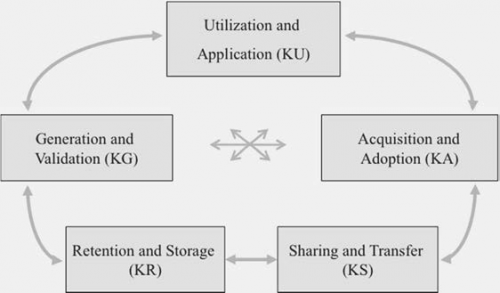Difference between revisions of "Knowledge process"
| Line 110: | Line 110: | ||
[[Category:Knowledge processes]] | [[Category:Knowledge processes]] | ||
| + | [[Category:Exemplar]] | ||
Revision as of 07:18, 24 September 2013
Definition
Knowledge process is Knowledge process is a process that acts on /or with knowledge, either individual knowledge or organizational knowledge. Source: [[]]
Summary
One paragraph summary which summarises the main ideas of the article.
Description
The following basic processes are the focus of KM activities and must be considered from a KP perspective in the organizational context:
- Identification;
- Capture;
- Generation or Creation;
- Processing and Transformation;
- Storage and Retention;
- Search and Retrieval;
- Representation;
- Transfer and Exchange;
- Maintenance and Updating.
These processes may occur in different sequences.
Source: Comparative Analysis of Methods and Tools for Nuclear Knowledge Preservation
Description
In the literature, authors such as N.T. Pham and F.W. Swierczek [1] describe the mechanisms by which knowledge is accumulated, disseminated and stored in organizations and many refer to these as knowledge processes. There are many different definitions of knowledge processes used in the literature. This research classified the more widely used and accepted definitions into one of five primary knowledge processes, shown below in Figure 1. The primary knowledge processes are defined as [2]:
- Knowledge acquisition and adoption;
- Knowledge generation and validation;
- Knowledge sharing and transfer;
- Knowledge retention and storage; and
- Knowledge utilization and application.
Knowledge processes can be viewed as the means by which organizations build, maintain and apply the tacit and explicit knowledge in all its various forms.
References
[1] PHAM, N.T., SWIERCZEK. F.W., Facilitators of organizational learning in design, The Learning Organization, 13, 2, (2006) 186–201.
